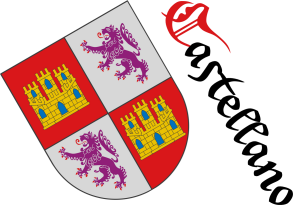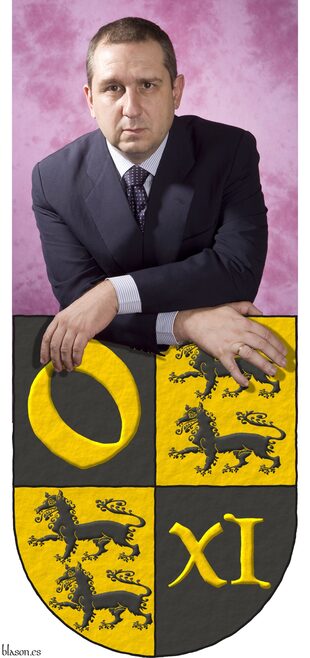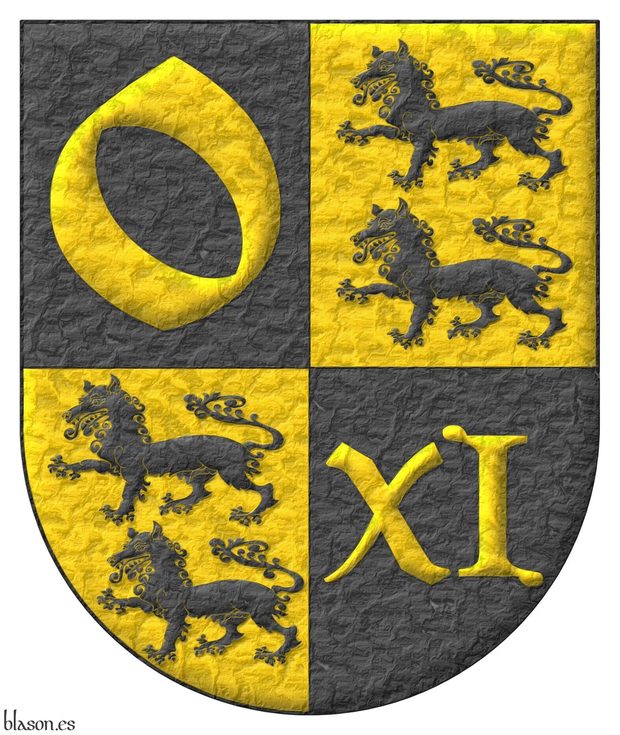
![Ver [García-Mercadal y García-Loygorri, F.; 2012] en referencias bibliográficas. Libro abierto, hojas de plata, filo de oro, guardas de gules, tapas de sable.](../css/Libro.Bibliografia.png)
García-Mercadal y García-Loygorri, F.; 2012
Fernando García-Mercadal y García-Loygorri, «La Regulación Jurídica de las Armerías: Apuntes de Derecho Heráldico Español», [Emblemata; 2012; pages 259-297], Volume 18th, Aragonesa de Emblemática Magazine, ERAE, Fernando El Católico Institution, ISSN 1137-1056, Zaragoza, 2012.
Bibliographical reference of century XXI.
Classification: Article.
The author is García-Mercadal y García-Loygorri, Fernando.
The following article cites this bibliographic reference:
External link:
Internal resources: GarciaMercadalF2012.Regulacion.pdf.


Artistic style

I would describe my heraldic artistry with three terms: clarity, symbolism, and methodology.
- It is clear because my work aims to create pieces that transmit energy and vital force to the owner and their relatives. I believe that a coat of arms should be a source of light and joy and an expression of freedom. That's why, in my heraldic creative process, I prefer drawing inspiration from the early stages of heraldic history to bring that freshness into the present.
- It is symbolic because coats of arms must represent their bearer, his/her ideals, goals, motivations, history, and anything he/she might want to display. Thus, the creation of a coat of arms should encompass all the meanings and symbols brought forth by the future owner, in accordance with heraldic rules and artistic contributions.
- It is methodical because heraldic art is founded on a science, the so-called «science of heraldry». This systematic knowledge has its principles, its composition rules, and its own formal language, all of which are the true foundations of my artistic methodology. The method should not be seen as a deterrent to creativity, but rather as a solid support and a guarantee of professional work.
This brief description of my artistic style is elaborated on in the following series of articles, where I provide a broader insight into my methodology, my artistic techniques, and my journey both artistically and personally.


![Ver [Emblemata; 1997] en referencias bibliográficas. Libro abierto, hojas de plata, filo de oro, guardas de gules, tapas de sable.](../css/Libro.Bibliografia.png)
Emblemata; 1997
Baron of Valdeolivos Emblematic Chair, of the Fernando el Catolico Institution, of the Centre of Scientific Research (C. S. I. C.) and of the Government of Zaragoza, «Emblemata», Volume 3rd, Emblemata Aragonese Magazine about Emblems (E. R. A. E.), 480 pages, 116 pictures, 2 maps, ISSN 1137-1056, Legal deposit Z.3.937 1996, printed by the Cooperativa de Artes Gráficas Librería General, Zaragoza, 1997.
Bibliographical reference of century XX.
Classification: Magazine and Castilian language.
The author is Cátedra de Emblemática Barón de Valdeolivos.
External resource:


Legal notice and data privacy

The legal disclaimer of the heraldic domain Blason.es, which is also applicable to all its associated heraldry domains, consists of the following sections:
- Associated heraldry domains
- User access and acceptance of norms
- Free content without guarantees
- Troubleshooting
- Copyright
- Ownership of blazons and coats of arms
About the privacy policy of the heraldic domain Blason.es and its associated heraldry domains you can read the following sections:
- This site does not use cookies
- Exercise of ARCO rights
- Registration in the AGPD
- Privacy and personal data
Identification data of the holder of Blason.es and its associated heraldry domains:
- Owner: Doctor Antonio Salmerón Cabañas.
- VAT number: ES 05262452Y.
- Registration code in the AGPD number: 2093060094.
- Contact email: .
- Domain address: Blason.es.
- you may consult alternative domains with similar content in associated heraldry domains.
- Postal address: Paseo de la Castellana 135, 7th floor, 28046 Madrid, Spain.


![Ver [Emblemata; 1996] en referencias bibliográficas. Libro abierto, hojas de plata, filo de oro, guardas de gules, tapas de sable.](../css/Libro.Bibliografia.png)
Emblemata; 1996
Baron of Valdeolivos Emblematic Chair, of the Fernando el Catolico Institution, of the Centre of Scientific Research (C. S. I. C.) and of the Government of Zaragoza, «Emblemata», Volume 2nd, Emblemata Aragonese Magazine about Emblems (E. R. A. E.), 396 pages, 89 pictures, ISSN 1137-1056, Legal deposit Z.3.937 1996, printed by the Cooperativa de Artes Gráficas Librería General, Zaragoza, 1996.
Bibliographical reference of century XX.
Classification: Magazine and Castilian language.
Author: Cátedra de Emblemática Barón de Valdeolivos.
External resource:


![Ver [Emblemata; 1995] en referencias bibliográficas. Libro abierto, hojas de plata, filo de oro, guardas de gules, tapas de sable.](../css/Libro.Bibliografia.png)
Emblemata; 1995
Baron of Valdeolivos Emblematic Chair, of the Fernando el Catolico Institution, of the Centre of Scientific Research (C. S. I. C.) and of the Government of Zaragoza, «Emblemata», Volume 1st, Emblemata Aragonese Magazine about Emblems (E. R. A. E.), 419 pages, 44 pictures, ISSN 1137-1056, Legal deposit Z.3.937 1996, printed by the Cooperativa de Artes Gráficas Librería General, Zaragoza, 1995.
Bibliographical reference of century XX.
Classification: Magazine and Castilian language.
Author: Cátedra de Emblemática Barón de Valdeolivos.
External link:


![Ver [Fernández-Xesta y Vázquez, E.; 2014a] en referencias bibliográficas. Libro abierto, hojas de plata, filo de oro, guardas de gules, tapas de sable.](../css/Libro.Bibliografia.png)
Fernández-Xesta y Vázquez, E.; 2014a
Ernesto Fernández-Xesta y Vázquez, «Emblemática en Aragón. La colección de piezas emblemáticas del archivo biblioteca del Barón de Valdeolivos», edited by the Royal Academy of Heraldry and Genealogy of Madrid in collaboration with El Justicia de Aragón and the Spanish Confederation of Local Studies Centers (CECEL-CSIC), 899 pages, with color and black-and-white illustrations, ISBN 978-84-88833-08-2, ISBN number immediately preceding its digital edition, Legal Deposit M. 192-2014, deposit number immediately preceding its digital edition, Madrid, 2014.
Also published in digital PDF format on CD-ROM as [Fernández-Xesta y Vázquez, E.; 2014b] with a print run of 1000 copies.
Bibliographical reference of century XXI.
Classification: Castilian language.
Author: Fernández-Xesta y Vázquez, Ernesto.
The following article cites this bibliographic reference:
External link:


![Ver [Fernández-Xesta y Vázquez, E.; 2014b] en referencias bibliográficas. Libro abierto, hojas de plata, filo de oro, guardas de gules, tapas de sable.](../css/Libro.Bibliografia.png)
Fernández-Xesta y Vázquez, E.; 2014b
Ernesto Fernández-Xesta y Vázquez, «Emblemática en Aragón. La colección de piezas emblemáticas del archivo biblioteca del Barón de Valdeolivos», edited by the Royal Academy of Heraldry and Genealogy of Madrid in collaboration with El Justicia de Aragón and the Spanish Confederation of Local Studies Centers (CECEL-CSIC), 899 pages, with color and black-and-white illustrations, ISBN 978-84-88833-09-9, ISBN number immediately following its print edition, Legal Deposit M. 193-2014, deposit number immediately following its print edition, Madrid, 2014.
Also published in physical print format as [Fernández-Xesta y Vázquez, E.; 2014a] with a print run of 100 numbered and signed copies by the author.
Bibliographical reference of century XXI.
The author is Fernández-Xesta y Vázquez, Ernesto.
Bibliographical reference mentioned in the following article:
External link:

Continue with: García-Mercadal y García-Loygorri, F.; 2010.
-
Language
-
Categories of heraldry
-
Divisions of the field
- Without divisions
- Party per pale
- Party per fess
- Party per bend
- Party per bend sinister
- Tierce
- Tierce sinister
- Tierced per pale
- Tierced per fess
- Tierced per bend
- Tierced pallwise inverted
- Quarterly
- Quarterly per saltire
- Gyronny
- Party per fess, the chief per pale
- Party per pale, the sinister per fess
- Party per fess, the base per pale
- Party per pale, the dexter per fess
- Chapé
- Chaussé
- Embrassé
- Contre-embrassé
- Party per chevron
- Enté
- Enté en point
- Flanched
-
Metals
-
Colours
-
Furs
-
Other tinctures
-
Ordinaries and sub-ordinaries
-
Diminutives of the ordinaries
-
Geometric charges
-
Composite ordinaries
-
Inanimate charges from Nature
Atom, Crescent, Diamond, Emerald, Estoile, Increscent, Lightning flash, Moon, Mount, Mullet, Mullet of four points, Orbital, Plough of Ursa Major, Rainbow, Ray of the sun, River, Sea, Snowflake, Sun, Sun in splendour, Sun of May, Terrestrial globe, Trimount, Water and Wave.
-
Vegetal charges from Nature
Acorn, Apple, Apple tree, Ash, Bluebonnet, Camellia, Chrysanthemum, Cinquefoil, Cornflower, Dogwood flower, Double rose, Eguzki-lore, Elm, Fleur de lis, Flower, Gourd, Holm oak, Hop cone, Indian paintbrush, Kapok tree, Laurel, Lily, Linden, Lotus flower, Madonna lily, Mexican cedar tree, Oak, Olive tree, Palm tree, Plantain plant, Pomegranate, Poplar leaf, Rose, Shamrock, Sunflower, Thistle, Tree, Tulip, Vine and Wheat.
-
Animal charges from Nature
Badger, Bald eagle, Barbel, Barn owl, Bear, Beaver, Bee, Beetle, Bighorn sheep, Binson, Blackbird, Boar, Brach hound, Bull, Cow, Doe, Dog, Dolphin, Dove, Eagle, Elephant, Falcon, Female figure, Fish, Flame, Fly, Fox, Frog, Goat, Goldfinch, Goose, Heron, Horse, Hummingbird, Jaguar, Lark, Leopard, Lion, Lion passant, Lion rampant guardant, Lioness, Lynx, Male figure, Martlet, Merino ram, Owl, Panther, Parrot, Peacock, Pelican, Pelican in her piety, Pronghorn, Puffin, Quetzal, Raven, Roe deer, Rooster, Savage, Seagull, Serpent, She-wolf, Stag, Starling, Talbot, Turtle, Tyger, Vulture, Warren hound and Wolf.
-
Parts of natural charges
Arm, Beak, Branch, Caboshed, Chest, Claw, Covert, Dorsal fin, Eagle claw, Ear of wheat, Ermine spot, Escallop, Feather, Foot (palmiped), Foreleg, Forepaw, Hand, Head, Heart, Hoof, Leaf, Neck, Ostrich feather, Palm frond, Paw, Roe deers' attires, Shoulder, Sprig, Stags' attires, Stem, Swallow-tail, Tail, Tail addorsed, Tail fin, Talon, Tibia, Tooth, Trunk, Trunk (elephant), Two hands clasped, Two wings in vol, Udder, Wing and Wrist.
-
Artificial charges
Ace of spades, Anchor, Anvil, Arch, Arm vambraced, Armillary sphere, Arrow, Axe, Bell, Bell tower, Beret, Bonfire, Book, Bookmark, Bow, Branding iron, Bridge, Broken, Buckle, Cannon, Cannon dismounted, Cannon port, Canopy roof, Carbuncle, Castle, Celtic Trinity knot, Chain, Chess rooks, Church, Clarion, Clay pot, Closed book, Club, Column, Comb, Compass rose, Conductor's baton, Cord, Covered cup, Crozier, Crucible, Cuffed, Cup, Cyclamor, Dagger, Displayed scroll, Double vajra, Drum, Ecclesiastical cap, Fanon, Federschwert, Fleam, Four crescents joined millsailwise, Galician granary, Garb, Gauntlet, Geometric solid, Grenade, Halberd, Hammer, Harp, Host, Hourglass, Key, Key ward, Knight, Knot, Lantern, Letter, Line, Loincloth, Maunch, Menorah, Millrind, Millstone, Millwheel, Monstrance, Mortar, Mullet of six points pierced, Nail, Non-classic artifact, Norman ship, Number, Oar, Oil lamp, Open book, Page, Pair of pliers, Pair of scales, Parchment, Pestle, Piano, Pilgrim's staff, Plough share, Polish winged hussar, Port, Portcullis, Potent, Quill, Ribbon, Rosette of acanthus leaves, Sabre, Sackbut, Sail, Scroll, Scythe, Sheaf of tobacco, Ship, Skirt, Spear, Spear's head, Stairway, Star of David, Step, Sword, Symbol, Tetrahedron, Torch, Tower, Trident, Trumpet, Turret, Two-handed sword, Wagon-wheel, Water-bouget, Wheel, Winnowing fan and With a turret.
-
Immaterial charges
Angel, Archangel, Basilisk, Dragon, Dragon's head, Garuda, Golden fleece, Griffin, Heart enflamed, Justice, Mermaid, Our Lady of Mercy, Ouroboros, Paschal lamb, Pegasus, Phoenix, Sacred Heart of Jesus, Saint George, Sea-griffin, Sea-lion, Trinity, Triton, Unicorn, Winged hand and Wyvern.
-
External elements
-
Heraldic creations
-
References
-
Formats
-
Keywords on this page
Artist, Article, Bibliography, Legal notice, Castilian language, Magazine, Century XX and Century XXI.
